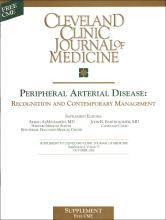ABSTRACT
Patients with peripheral arterial disease (PAD) are at increased risk of myocardial infarction or stroke, since multiple vascular beds, beyond the extremities, are likely to be affected by atherosclerosis. In addition to management of leg symptoms in patients with PAD, aggressive modification of cardiovascular risk factors is essential. Smoking cessation, antiplatelet medications, statin drugs, and blood pressure control are proven therapies and strategies for prolonging the lives of patients with PAD. Intensive glycemic control in diabetic patients with PAD lowers the risk of microvascular complications, such as nephropathy, and may reduce the risk of major cardiovascular events and lower extremity amputation. Although aggressive cardiovascular risk-factor modification for patients with PAD may be intuitive, these lifesaving medical therapies for PAD are greatly underprescribed.
Footnotes
↵* Dr. Gornik reported that she has received research grant support from Pfizer. Dr. Creager reported that he has received consulting fees from Genzyme, Sigma Tau, Vasogen, and Wyeth, and has received consulting fees as well as honoraria for teaching and speaking from the Bristol-Myers Squibb/Sanofi Pharmaceuticals Partnership.
- © 2006 The Cleveland Clinic Foundation. All Rights Reserved.






